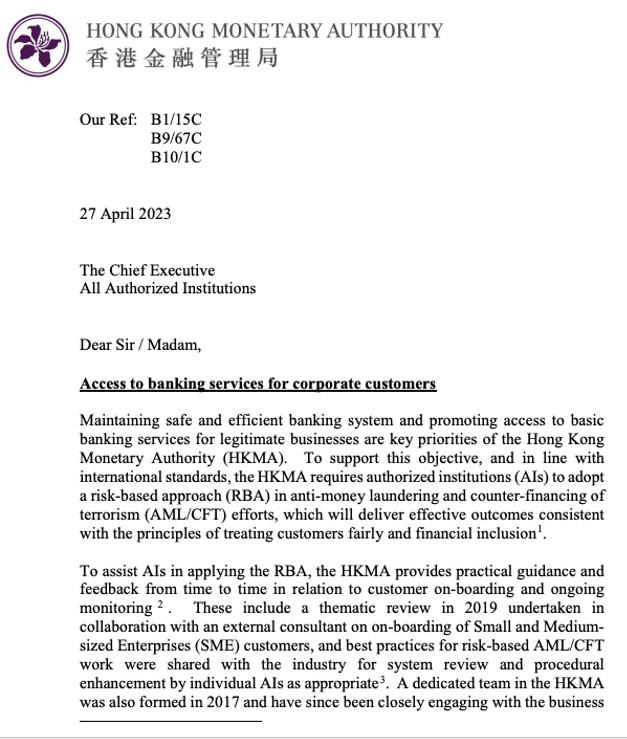 |
| By Jurica Dujmovic |
According to Financial Times, the Hong Kong Monetary Authority has extended yet another “warm welcome” to crypto by urging prominent banks — including HSBC (HSBC) and Standard Chartered (SCBFY) — to embrace crypto exchanges as clients.

A further testament to the Chinese government's seriousness in this venture is a tweet by Hong Kong Legislative Council Member Johnny Ng. He warmly invited global crypto platforms, including Coinbase (COIN), to migrate their operations to China.

Although the U.S. was once a pioneer in the world of cryptocurrencies, it now seems to be falling behind. This is creating a power vacuum that China appears eager to fill.
For an avid crypto proponent like me, this shift in power dynamics is disheartening. You see, the U.S. Securities and Exchange Commission's recent lawsuits against Binance and Coinbase have sent chilling effects throughout the industry, marking a stark contrast to the warmth radiating from the East.
However, if you have been reading my recent articles, you would know that this recent Chinese initiative to court the crypto businesses of the West is not what it seems. While some may think this is a godsend — especially considering the ongoing crypto persecution in the U.S. — the truth is more nuanced, and markedly more sinister.
In my recent interview with Gabriella Kusz, CEO of the Global Digital Asset and Cryptocurrency Association, we explored China’s underlying intentions. Kusz explained that this move might be less of a change in China’s attitude toward crypto, and more a strategic decision to attract foreign investment and technology firms into mainland China.
If past involvements with China have taught us anything, it is that with this lure comes the risk of intellectual property theft and regulatory shackles. The latter of which can make it especially difficult for these companies to operate freely or exit the market.
In other words, once these companies leave the U.S. and transfer their operations to China, there is no guarantee that China will not make a 180-degree turn on its policies.
This means it could nationalize the technology and assets, while also locking up the remainder of the capital these companies bring in.
It goes without saying that Chinese banks — which are largely state-owned — are aiming to exert a significant level of control and influence over the industry. The implications of this can be far-reaching, potentially even shaping the future trajectory of the global crypto ecosystem in China's image.
Even if a scenario like the one above never comes to fruition, a look at Hong Kong’s crypto rulebook paints a sobering picture.
To name a few, the Securities and Futures Commission — Hong Kong’s securities watchdog — imposes a 12-month cooling-off period between a token launch and listing and bans stablecoins and bans crypto derivatives, airdrops, earn or lend programs and likely will ban staking services.
Undoubtedly, these restrictions pose significant operational challenges for crypto businesses accustomed to a more agile and dynamic environment.
Furthermore, moving to Hong Kong doesn't provide an automatic shield against U.S. regulation or the reach of the SEC, as cases like BitMEX and Binance have shown.
This is where I must stress the inherent paradox. The essence of cryptocurrencies lies in empowering individuals and democratizing finance. So, the prospect of a single, heavily centralized and autocratic ruling body like the Chinese Communist Party exercising excessive control over the industry profoundly contradicts these founding principles.
My two cents to cryptocurrency firms considering a move to Hong Kong is this: Don’t.
Despite the siren call from the HKMA and other Chinese entities, this complex web of local regulations, challenging business environment and unyielding hand of the Chinese government should give any business serious pause.
Instead of succumbing to a seemingly easy solution, the crypto industry should leverage this moment to reaffirm its core principles of decentralization, democratization and empowerment.
The challenges we face are not just about regulation and geography. They're about the very essence of what cryptocurrencies represent. Indeed, the cryptocurrency industry was born out of a desire to disrupt the status quo and establish a new paradigm in finance.
At times like these, we should remember the indomitable spirit that gave birth to Bitcoin (BTC, “A-”) and its peers, and the collective resilience we have shown over the years in the face of adversity.
There is no doubt that the road ahead is fraught with uncertainty and challenges. However, I believe that the industry is robust enough to weather this storm and emerge stronger.
After all, innovation thrives in adversity. Now is the time to reevaluate, innovate and chart our own course in the financial world, away from the shadows of governments.
Remember, this is not just about surviving the present; it's about shaping the future.
We are on the precipice of a new era in digital finance, and the choices we make now will define the contours of this landscape. Choose wisely.
Best,
Jurica

